英语词汇学1.ppt
合集下载
初中英语词汇学精美课件ppt (1)

• oligarchy ['ɔliɡɑ:ki]
(olig-少,寡+ archy 统治→政治)→
寡头政治,寡头统治
• polyarchy [&# archy) →
多头政治
• gynarchy ['ɡainɑ:ki]
(gyn-妇+ archy) →
妇人政治
• patriarch ['peitriɑ:k ]
11. anthrop(o):人,人类
• anthropology [,ænθrə'pɔlədʒi] (anthropo + -logy 学科)→ 人类学
• anthropography [,ænθrə‘pɔɡrəfi] (anthropo + -graphy…学)→ 人类志,人类分布学
• anthropoid ['ænθrəupɔid] n./adj. (anthropo+ -oid 外形)→ 类人猿
(astro +dome圆屋顶) → 天文航行舱;天体观测窗
• astronavigation ['æstrəu,nævi'ɡeiʃən]
(astro + navigation航行) →
太空航行
• asteromycin
(aster + o + mycin霉菌素) →
星霉素
15. atmo:大气,蒸汽
• archangel ['ɑ:keindʒəl] (arch+ angel 天使)→
大天使,天使长
• archfiend [,ɑ:tʃ'fi:nd] (arch+ fiend 魔鬼) → 魔王,撒旦
英语词汇学张维友编第一讲.ppt

1.2 Sound and Meaning
• Before we detect the relationship between sound and meaning of the word, let’s look at the two famous sayings:
• (1) What’s in a name? that which we call a rose, by any other name would smell as sweet.
• The conventionalists, like Shakespeare,
hold that the relations between sound and meaning are conventional and arbitrary(任 意的).
• The naturalists have argued that the origin of language lies in onomatopoeia(拟声,bang, crash, clash,可讲解它们的词类转义), that people began talking by creating iconic(图象) signs to imitate the sounds heard around them in nature. They maintain that there is a natural connection between sound and meaning.
• As defined in terms of spoken language, a word is viewed as a sound or combination of sounds which are made voluntarily with human vocal equipment. According to semanticists, a word is a unit of meaning. Grammarians, however, insist that a word be a free form that can function in a sentence.
词汇学(第一章)-PPT课件
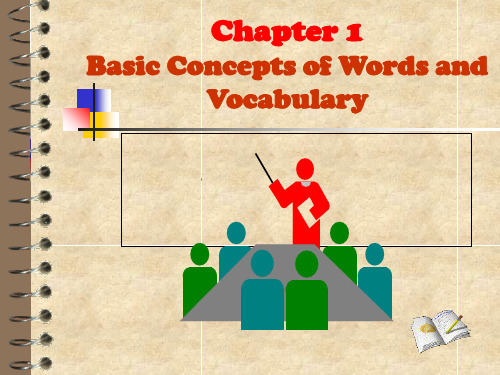
.
14
3. Native words and borrowed words 本族语词和外来语词
Native words / Angle-Saxon words
Words of Anglo-Saxon origin are native
words. They form the great majority of the
.
13
Another important characteristic is that function words belong to a relatively small and permanent set of words, in comparison to content words. The total number of functional words is about 154. They are stable; they do not come and go with changing fashions and ideas.
basic word stock of the English language.
The basic word stock is the foundation of the
vocabulary accumulated over a number of
epochs. Most native words in modern
.
6
What causes the differences between sound and form?
➢ 1) More morphemes than letters, ➢ 2) Stabilization of spelling, ➢ 3) Deliberate change of spelling by
[英语学习]英语专业词汇学ppt
![[英语学习]英语专业词汇学ppt](https://img.taocdn.com/s3/m/3e91c662ad51f01dc381f1b6.png)
• bow /bcu/ n the device used for shooting arrows
• saw /scu/ v to scatter seeds
• sow /sau/ n female adult pig
h
17
Homophone
Identical only in sound but different in spelling and meaning, e.g. • dear /dic/ n a loved person • deer /dic/ n a kind of animal • son /s?n/ n a male child of someone • sun /s?n/ n the heavenly body from which the earth gets warmth and light
• (4) any effective remedy;
• (5) (BrE) molassehs.
12
• 例1:board:木板→餐桌→会议桌→董事 会
• 例2:candidate:穿白袍的人→身着白袍申 请职位的人→候选人
5.2 Homonymy
• Homonyms are generally defined as words different in meaning but either identical both in sound and spelling or identical only in sound or spelling.
h
4
Two Approaches to Polysemy
• The problem of interrelation of the various meanings of the same word can be dealt with from two different angles: diachronic approach and synchronic approach.
《英语词汇学第一章》PPT课件
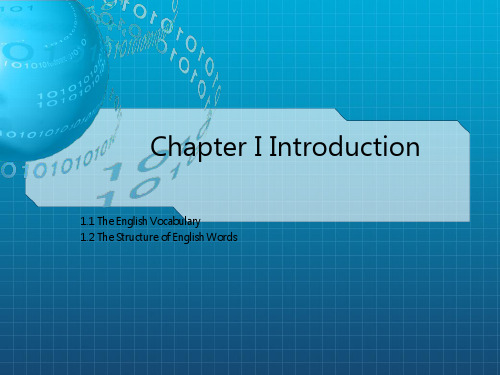
A morpheme may be represented by one syllable, lik e boy and child, or by two or more syllables, as in la· dy, cro·co·dile, etc.
• B. Allomorphs 词素变体 • A morpheme may take various shapes or forms. • 如:books, pigs, horses共同词素是什么? • 曲折词素-(e)s。 • 有三种不同发音:/-s, -z, -iz/
• An elusive notion • have has had ? • friend friends ?
• entry词条in a dictionary --- lexeme 词位 • word form 词形:词的不同形状 • lexical unit 词汇单位:一个词形跟一个意义的结合
• Definition: • A word is an independent, minimal, meaningful linguistic unit.
• 粘着词根大多源自希腊语或拉丁语,不能独立使用。
• 观察下面几个单词,找出共同词根: • revive, vitamin, vital, vivacious, vivid • 拉丁词根:vit-/viv-, 意思:life or live • 复兴,复活;维生素;十分重要的;生机勃勃的,活泼的;生动的
zable into smaller forms. • 词素是语言中最小的语音语义结合体。(P13)
• Q: What’s the difference between a “word” & a “morpheme”? • 词:能独立运用的、最小的语音语义结合体 • 词素:不一定能独立运用 • Example • 试分析:denationalization共有几个词素? • nation • nation+al • nation+al+ize • de-nation+al+ize • de-nation-al-iz-ation 使非国有化,使私营化
• B. Allomorphs 词素变体 • A morpheme may take various shapes or forms. • 如:books, pigs, horses共同词素是什么? • 曲折词素-(e)s。 • 有三种不同发音:/-s, -z, -iz/
• An elusive notion • have has had ? • friend friends ?
• entry词条in a dictionary --- lexeme 词位 • word form 词形:词的不同形状 • lexical unit 词汇单位:一个词形跟一个意义的结合
• Definition: • A word is an independent, minimal, meaningful linguistic unit.
• 粘着词根大多源自希腊语或拉丁语,不能独立使用。
• 观察下面几个单词,找出共同词根: • revive, vitamin, vital, vivacious, vivid • 拉丁词根:vit-/viv-, 意思:life or live • 复兴,复活;维生素;十分重要的;生机勃勃的,活泼的;生动的
zable into smaller forms. • 词素是语言中最小的语音语义结合体。(P13)
• Q: What’s the difference between a “word” & a “morpheme”? • 词:能独立运用的、最小的语音语义结合体 • 词素:不一定能独立运用 • Example • 试分析:denationalization共有几个词素? • nation • nation+al • nation+al+ize • de-nation+al+ize • de-nation-al-iz-ation 使非国有化,使私营化
词汇学第一章 The Basic Concepts of Words and VocabularyPPT
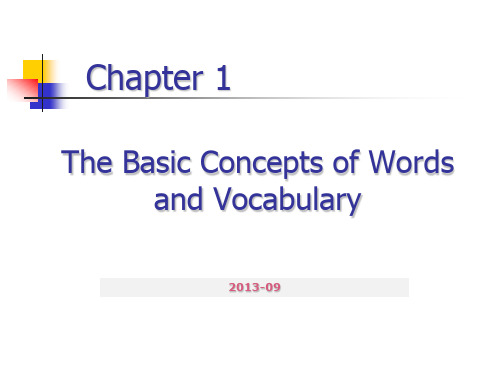
1.4 Sound and Form
Task 1 Say the following words by yourself.
cough
thought
though
thorough
tough
through
Question: why is there the disparity?
The international reason Changes Borrowings
1.3 Sound and Meaning
In how many languages do you know the name of the animal in this picture?
Task 1 Say the name of the animal in
as many languages as you can.
content words and which are functional words? denote never and run notion upon seven Christmas have would
1.5.3 Native words & borrowed words
Task
Guess whether the statements are true or false.
non-basic vocabulary
Not all the words of the basic word stock have these features.
Non-basic vocabulary include:
Terminology 专业术语 Jargon 行话 Slang 俚语 Argot 隐语 Dialectal words 方言词 Archaisms 古词语 Neologisms 新词语
英语词汇学授课课件 PPT
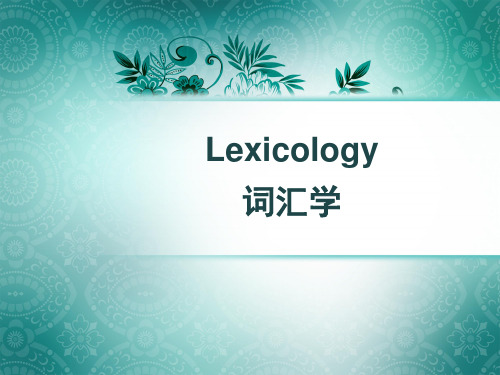
❖ 2. synonyms and idioms
B: rapid growth of present-day English Vocabulary and Its causes
❖ Neologisms(新词) after World War II ❖ Reasons: ❖ 1. progress of science and technology科技
❖ This definition emphasizes syntax(句法), but does not touch upon meaning.
Antoine Meillet
❖ “A word is defined by the association of a given sense with a given group of sounds capable of a given grammatical use.” (p.2, para.2 )
Bloomfield布洛姆菲尔德(美国语言学家教育 家) and ❖ a French linguist, Antoine Meillet(梅耶,法 国语言学家)
Bloomfield
❖ “some linguistic forms(语言形态), which we call bound forms(限定/非自由形态) are never used as sentences.
invaded by Angles盎格鲁, Saxons撒克逊, Jutes朱特人
❖ Vocabulary: 5000-6000 words,chiefly Anglo-Saxon/ some Old Norse古斯堪的那维 亚语
❖ Old Norse words (are, they, their, them, till, call, die, give, take, skin, window, ill, weak)
B: rapid growth of present-day English Vocabulary and Its causes
❖ Neologisms(新词) after World War II ❖ Reasons: ❖ 1. progress of science and technology科技
❖ This definition emphasizes syntax(句法), but does not touch upon meaning.
Antoine Meillet
❖ “A word is defined by the association of a given sense with a given group of sounds capable of a given grammatical use.” (p.2, para.2 )
Bloomfield布洛姆菲尔德(美国语言学家教育 家) and ❖ a French linguist, Antoine Meillet(梅耶,法 国语言学家)
Bloomfield
❖ “some linguistic forms(语言形态), which we call bound forms(限定/非自由形态) are never used as sentences.
invaded by Angles盎格鲁, Saxons撒克逊, Jutes朱特人
❖ Vocabulary: 5000-6000 words,chiefly Anglo-Saxon/ some Old Norse古斯堪的那维 亚语
❖ Old Norse words (are, they, their, them, till, call, die, give, take, skin, window, ill, weak)
1英语词汇概说ppt课件
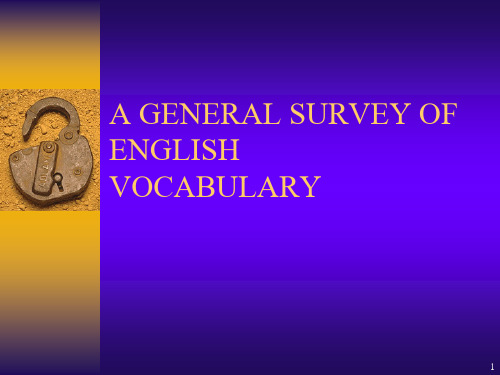
10
பைடு நூலகம்
实义词表示明确的含义或概念,它包括名 词(noun)、动词(verb)、形容词(adjective)、 副词(adverd)、数词(numeral)等。它表示 物体、现象、动作、品质、状态、程度和 数量等。实义词构成了英语词汇的绝大部 分,数量极大。
Content words (notional words) denote clear notions, including: nouns, verbs, ajectives, adverbs and numerals, which denote objects, phenomena, action, quality, state, degree and quantity.
基本词汇包括七个部分:(1)术语 (terminology);(2)行话(jargon);(3) 俚语(slang);(4)隐语或黑话(argot); (5)方言(dialectal words);(6)古语 (archaisms)和 (7)新语(neologism)
9
(二)根据词的功能,英语词汇可以分 为实义词(content words)即“实词” 和功能词(function words)即“虚词”。
2
词汇学 (lexicology) 是语言学 (linguistics) 的一个分支,它研究词的起源和意义。
Lexicology is a branch of linguistics, inquiring into the origins and meanings of words.
3
英语词汇学(English lexicology)旨在研究英 语词汇的形态结构、语义结构、语义关系、历 史演变以及词的构成和用法等。这是一门理论 课。
பைடு நூலகம்
实义词表示明确的含义或概念,它包括名 词(noun)、动词(verb)、形容词(adjective)、 副词(adverd)、数词(numeral)等。它表示 物体、现象、动作、品质、状态、程度和 数量等。实义词构成了英语词汇的绝大部 分,数量极大。
Content words (notional words) denote clear notions, including: nouns, verbs, ajectives, adverbs and numerals, which denote objects, phenomena, action, quality, state, degree and quantity.
基本词汇包括七个部分:(1)术语 (terminology);(2)行话(jargon);(3) 俚语(slang);(4)隐语或黑话(argot); (5)方言(dialectal words);(6)古语 (archaisms)和 (7)新语(neologism)
9
(二)根据词的功能,英语词汇可以分 为实义词(content words)即“实词” 和功能词(function words)即“虚词”。
2
词汇学 (lexicology) 是语言学 (linguistics) 的一个分支,它研究词的起源和意义。
Lexicology is a branch of linguistics, inquiring into the origins and meanings of words.
3
英语词汇学(English lexicology)旨在研究英 语词汇的形态结构、语义结构、语义关系、历 史演变以及词的构成和用法等。这是一门理论 课。
英语词汇学(1)PPT
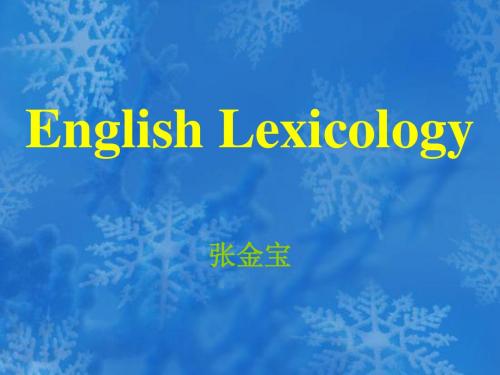
3. Approach (system)
■
derivation
A process by which noninflectional affixes can be added to roots to form words e.g.: persistence circumspect
4. Lexicology (structural analysis)
aero: aero-plane, aerodrome, ■ aqua: aquarium, aquatic ■ sol: parasol, sub-solar, solar ■ agri: agri-motor, agrology ■ anthrop: philanthropist, anthropotomy ■ bio: biocide, bio-clean, biology ■ vor: carnivore, carnivorous, herbivore, ■ act: activate, inaction, interact
I. Survey
■ ■ ■ ■ ■ ■
Importance (two questions) Objective (memory, retrieval) Approach (system) Lexicology (structural analysis) Sociology (system’s construction) Terms for lexicology (five)
■ ■
lexical, lexicon, lexicographer mythology, theology, psychology, sociology
4. Lexicology (word memory)
英语词汇学1 ppt课件

Ultimately improve your receptive and productive skills in language processing as well as language production.
Recommended Readings:
❖ 汪榕培、卢晓娟,1997,《英语词汇学教程》。上海:上海外语教育 出版社。
• 你所经历的课堂,是讲座式还是讨论式? • 教师的教鞭
• “不怕太阳晒,也不怕那风雨狂,只怕先生骂我 笨,没有学问无颜见爹娘 ……”
• “太阳当空照,花儿对我笑,小鸟说早早早……”
What is linguistics?
Generally speaking, linguistics can be defined as the scientific study of language. To be more exact, linguistics studies the general principles upon which languages are constructed and operate as systems of human communication.
Heinle & Heinle. ❖ Nation, I. S. P. 2001. Learning Vocabulary in Another Language.
Cambridge: CUP.
Grading
Homework assignments and attendance: 30%
Final Exam: 70%
English Lexicology
Name: Chenyuan E-mail: Tel No:15824914095
Recommended Readings:
❖ 汪榕培、卢晓娟,1997,《英语词汇学教程》。上海:上海外语教育 出版社。
• 你所经历的课堂,是讲座式还是讨论式? • 教师的教鞭
• “不怕太阳晒,也不怕那风雨狂,只怕先生骂我 笨,没有学问无颜见爹娘 ……”
• “太阳当空照,花儿对我笑,小鸟说早早早……”
What is linguistics?
Generally speaking, linguistics can be defined as the scientific study of language. To be more exact, linguistics studies the general principles upon which languages are constructed and operate as systems of human communication.
Heinle & Heinle. ❖ Nation, I. S. P. 2001. Learning Vocabulary in Another Language.
Cambridge: CUP.
Grading
Homework assignments and attendance: 30%
Final Exam: 70%
English Lexicology
Name: Chenyuan E-mail: Tel No:15824914095
英语词汇学 ppt课件
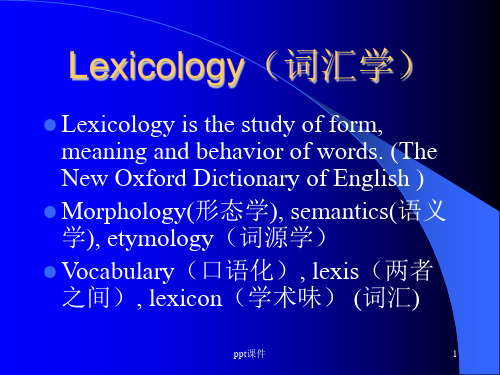
eg. (1) hām(home)的变格: Singular
Subjective hām
Possessive hāmes
Patient
hāme
Objective hām
Plural hāmas hāma hāmum hāmas
ppt课件
23
6)Loan Words 外来语
(1) Introduction of Christianity(基督教) Fr. Latin: bargain, cheap, inch, pound, cup, dish, wall, wine, etc.; abbot, alter, candle, disciple, hymn, martyr, num, priest, pope, shrine, temple, etc. (2) Scandinavian invasion — Vikings Fr. Old Norse: are, they, their, them, till, call, die give, take skin, sky, window, ill, weak, etc.
3000 BC, Iberians --- Neolithic
500 BC, Celts
55BC – 410 AD, the Roman occupation
55BC: Julius Caesar
43AD: Emperor Claudius
--- The Roman Conquest罗马人的征服
inflectional and derivational affix?
ppt课件
4
6. What is the difference between prefixation and suffixation?
初中英语词汇学精美课件ppt (1)

• Altimeter
• (起连接作用) n.
•
(高度计)
• altimetry
•
(…学)
•
(测高学)
• Altitude (抽象n.后缀)
•
(高度)
•Exalt (高
向上
使…升高)v.
( 提升,提拔)
• Alto (男高音)
•Contralto (contr-相反)
•
(女低音)
• Agrarian (adj.词缀)
•
(土地的)
• Agrimotor
•
(农用汽车,拖拉机)
• Agrobiology(生物学)
•
(农业生物学)
•Agronomy (…学)
•
(农业经济学)
•Agrotechny
•
(农产品加工学)
• Agrotype(类型)
•
(农业型)
• Alt=high(高)
(议程,日常工作事项)
Agile(易于…的)
ቤተ መጻሕፍቲ ባይዱ
(敏捷的)
enact in (正在表演)
(扮演)
• Transact
Through(通过,行得通)
•
•
(处理,执行交易行得通)
• Interact
• between ,among(交互作用)
•
(互相影响)
• agr, agri =field(田地,农业)
• Acouphone 仪器(与声音有关)
•
(助听器)
•Aer(o) ['εərəu] =air 空中, 航空
•Aerodrome [‘eərə,drəum] (飞机跑的
地方) |( run)
初中英语词汇学精美课件ppt (1)
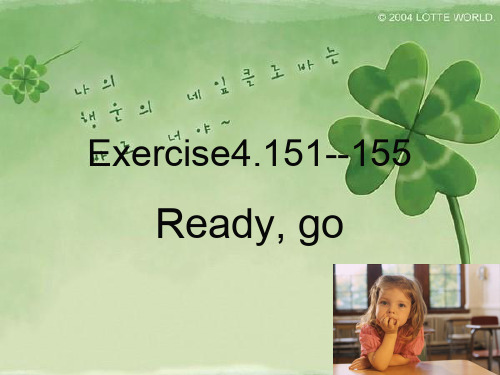
妩媚的
tractor=tract+or(者,物)n.拖拉机,牵引者 traction=tract+ion(名词后缀)n.牵引力,拖拉 tractive=tract+ive(形容词后缀)adj.牵引的,拖的 distract=dis(否定,相反)+tract v.分心,困扰 contract=con(together)+tract v.收缩,缔结,感
adj.热力学的,热力的
thermonuke=thermo(热)+nuke(核武器)
n.核子武器
thermowear=thermo(热)+wear(衣着,装)
n.保温衣服
Tort=twist(扭,曲)
torsion=tor+ion(名词后缀)n.扭转
tortile=tort+ile(…的)adj.卷的,扭转的
n.无神论者
atheism=a(没有)+the(神)+ism(理论)
n.无神论
monotheism=mono(单一)+the(神)+ism(理论)
n.一神论,一神教
pantheism=pan(all)+the(神)+ism(理论)
n.泛神论,多神教
Thermo=heat(热的,与温度有关的)
n. 有神论,一神教
theist=the+ist(者)
n.有神论者,一神论者
theologian=theo+log(学)+ian(者)
n.神学家,神学者
theocracy=theo(神)+cracy(权力)
tractor=tract+or(者,物)n.拖拉机,牵引者 traction=tract+ion(名词后缀)n.牵引力,拖拉 tractive=tract+ive(形容词后缀)adj.牵引的,拖的 distract=dis(否定,相反)+tract v.分心,困扰 contract=con(together)+tract v.收缩,缔结,感
adj.热力学的,热力的
thermonuke=thermo(热)+nuke(核武器)
n.核子武器
thermowear=thermo(热)+wear(衣着,装)
n.保温衣服
Tort=twist(扭,曲)
torsion=tor+ion(名词后缀)n.扭转
tortile=tort+ile(…的)adj.卷的,扭转的
n.无神论者
atheism=a(没有)+the(神)+ism(理论)
n.无神论
monotheism=mono(单一)+the(神)+ism(理论)
n.一神论,一神教
pantheism=pan(all)+the(神)+ism(理论)
n.泛神论,多神教
Thermo=heat(热的,与温度有关的)
n. 有神论,一神教
theist=the+ist(者)
n.有神论者,一神论者
theologian=theo+log(学)+ian(者)
n.神学家,神学者
theocracy=theo(神)+cracy(权力)
初中英语词汇学精美课件ppt (1)

“两年一次的,(植物)两年生的”
anniversary,n.(ann年,-i-起连接 作用,vers转,-ary,作n.后缀) “一年转换一次的”即周年纪念
How about”superannuated”?
ANIM=BREATH气息;MIND心
animal,n.(anim气息,-al表示物
的后缀 )
“幅度,振幅,波幅”
radioamplifier,n.(radio广播,无线电
收发设备,ampl大,-i-连接
词 ,-fier表 示n.后缀)
“高频放大器”
amply,n.(ampl大 ,-y常用作副词词
尾)
“广大的,广泛的,详细的”
How about”amplify”?
ambul 行走,-ant……的)
“夜晚行走”即梦游
perambulate ,v. (per贯穿,到
处,ambul行走, -ate常
用作动词词尾 )
“徘徊,漫步于”
How
about“preambulate,promenade”?
AMPL=LARGE,SPACIOUS“大,宽”
amplitude , n.( ampl 大,-itude 抽象n.
体的n.后缀)
“有气息的物体”,即动物
animalcule,n.(anim气息,-al表示
n.后缀,-cule小,微量的n.后缀)
“小而微量的动物”即微生物
animate,n.(anim气息,-ate此时
用作adj.词尾)
“有气息的”即有生命的,活的
初中英语词汇学精美课件ppt (1)

F. He quotes them extensively nevertheless, together with other equally suspect evidence, because otherwise he would have no straw with which to make his bricks.
E. They four had one likeness: their appearance and their work was as it were a wheel in the middle of the wheel.
wheels within wheels: A situation which is difficult to understand because it involves complicated secret processes and decisions.错 综复杂;盘根错节
B. Fleur’s head was lost in the tool—box, but her voice was heard saying:“too many cooks, better let me.”
too many cooks spoil the broth: பைடு நூலகம்f too many peoples are involved in doing something, it will not be done well. 厨师多了烧坏汤;人 多手杂反坏事;人多添乱
have a finger in many pie: To be involved in a lot of different
activities and have influence over
英语词汇学教程课件第1章English Lexicology 1
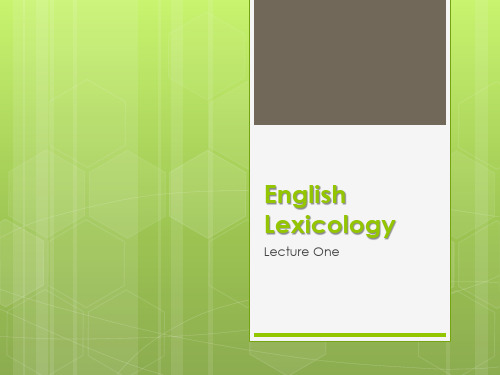
Lexicography involves the writing and compilation of dictionaries, especially dealing with the principles that underlie the process of compiling and editing dictionaries.
a new waste paper basket
The second type of definition considers the word as a thought unit or a psychological unit.
Farmer Rethink Spoonful all of a sudden as usual.
Semantics
Semantics studies meaning. It is usually approached from one of two perspectives: philosophical or linguistic.
Philosophical semantics is concerned with the logical properties of lanபைடு நூலகம்uage, the nature of formal theories, and the language of logic.
Linguistic semantics involves all aspects of meaning in natural languages, from the meaning of complex utterances in specific context to that of individual sounds in syllables.
- 1、下载文档前请自行甄别文档内容的完整性,平台不提供额外的编辑、内容补充、找答案等附加服务。
- 2、"仅部分预览"的文档,不可在线预览部分如存在完整性等问题,可反馈申请退款(可完整预览的文档不适用该条件!)。
- 3、如文档侵犯您的权益,请联系客服反馈,我们会尽快为您处理(人工客服工作时间:9:00-18:30)。
Ultimately improve your receptive and productive skills in language processing as well as language production.
Recommended Readings:
❖ 汪榕培、卢晓娟,1997,《英语词汇学教程》。上海:上海外语教育 出版社。
The significance of the course:
Develop your personal vocabulary and consciously increase your word power (active vocabulary).
Understand word-meaning and organize, classify and store words more effectБайду номын сангаасvely.
“Language is man’s way of communication with his fellow man and It is language alone which separate him from the lower animals”
What is linguistics?
Generally speaking, linguistics can be defined as the scientific study of language. To be more exact, linguistics studies the general principles upon which languages are constructed and operate as systems of human communication.
Chapter I
English Vocabulary: --- A General Survey
English is a language of complex components. On the one hand , English, as a Germanic languages, shares similar grammatical structures and many common words with other languages in the Germanic language group such as German, Dutch, Danish, Flemish and Swedish. On the other hand, half of its vocabulary is derived from the Latin directly or French and other romance languages. In addition, English vocabulary contains many borrowing from many other languages in the world, Hindi, Arabic, Malay, Chinese, American Indians, etc
What is lexicology?
Lexicology is a branch of linguistics concerned with the study of the vocabulary of a given language. It deals with words, their origin, development, structure, formation, meaning and usage.
English Lexicology
Name: Chenyuan E-mail:chenyuan0478@ Tel No:15824914095
What is language?
Language is a system of arbitrary vocal symbols used for human communication. It is a specific social action and a carrier of information.
Aims of the course:
Give a systematic description of the English vocabulary.
Offer an insight into the origin and development of the English vocabulary.
Discuss the problems of word-structure and wordformation
Study the use of English words , their meanings and changes in meaning, their sense relations.
Heinle & Heinle. ❖ Nation, I. S. P. 2001. Learning Vocabulary in Another Language.
Cambridge: CUP.
Grading
Homework assignments and attendance: 30%
Final Exam: 70%
❖ 林承璋, 2005, 《英语语言学引论》。武汉:武汉大学出版社。 ❖ 林福美,1985,《现代英语词汇学》。合肥:安徽教育出版社。 ❖ 张维友,1999《英语词汇学》。北京:外语教学与研究出版社。 ❖ 张韵斐、周锡卿,1986,《现代英语词汇学概论》(An Introduction
to Modern English Lexicology)。北京:北京师范大学出版社。 ❖ Nation, I. S. P. 1990. Teaching and Learning Vocabulary. Boston:
Raise your awareness of meaning and usages, use words more accurately and appropriately.
Develop your skills and habits of analyzing and generalizing linguistic phenomena in your learning experiences.
Recommended Readings:
❖ 汪榕培、卢晓娟,1997,《英语词汇学教程》。上海:上海外语教育 出版社。
The significance of the course:
Develop your personal vocabulary and consciously increase your word power (active vocabulary).
Understand word-meaning and organize, classify and store words more effectБайду номын сангаасvely.
“Language is man’s way of communication with his fellow man and It is language alone which separate him from the lower animals”
What is linguistics?
Generally speaking, linguistics can be defined as the scientific study of language. To be more exact, linguistics studies the general principles upon which languages are constructed and operate as systems of human communication.
Chapter I
English Vocabulary: --- A General Survey
English is a language of complex components. On the one hand , English, as a Germanic languages, shares similar grammatical structures and many common words with other languages in the Germanic language group such as German, Dutch, Danish, Flemish and Swedish. On the other hand, half of its vocabulary is derived from the Latin directly or French and other romance languages. In addition, English vocabulary contains many borrowing from many other languages in the world, Hindi, Arabic, Malay, Chinese, American Indians, etc
What is lexicology?
Lexicology is a branch of linguistics concerned with the study of the vocabulary of a given language. It deals with words, their origin, development, structure, formation, meaning and usage.
English Lexicology
Name: Chenyuan E-mail:chenyuan0478@ Tel No:15824914095
What is language?
Language is a system of arbitrary vocal symbols used for human communication. It is a specific social action and a carrier of information.
Aims of the course:
Give a systematic description of the English vocabulary.
Offer an insight into the origin and development of the English vocabulary.
Discuss the problems of word-structure and wordformation
Study the use of English words , their meanings and changes in meaning, their sense relations.
Heinle & Heinle. ❖ Nation, I. S. P. 2001. Learning Vocabulary in Another Language.
Cambridge: CUP.
Grading
Homework assignments and attendance: 30%
Final Exam: 70%
❖ 林承璋, 2005, 《英语语言学引论》。武汉:武汉大学出版社。 ❖ 林福美,1985,《现代英语词汇学》。合肥:安徽教育出版社。 ❖ 张维友,1999《英语词汇学》。北京:外语教学与研究出版社。 ❖ 张韵斐、周锡卿,1986,《现代英语词汇学概论》(An Introduction
to Modern English Lexicology)。北京:北京师范大学出版社。 ❖ Nation, I. S. P. 1990. Teaching and Learning Vocabulary. Boston:
Raise your awareness of meaning and usages, use words more accurately and appropriately.
Develop your skills and habits of analyzing and generalizing linguistic phenomena in your learning experiences.
